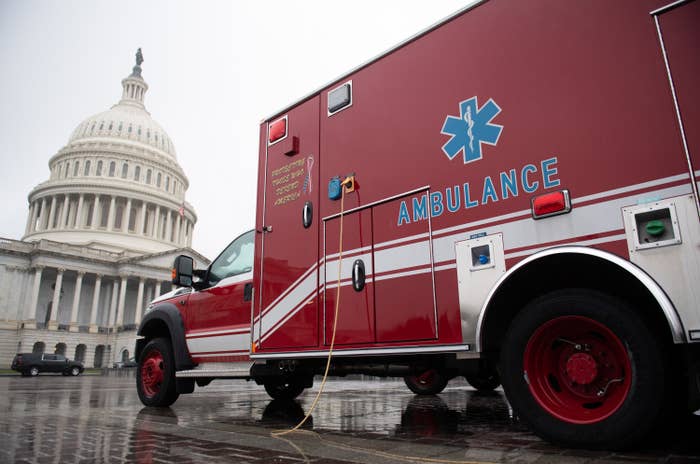
Congress is rushing to pass an emergency bill that will devote at least $1 trillion — and maybe much more, by some estimates — to helping people and businesses impacted by the coronavirus pandemic. It’s desperately needed, given forecasts like 3 million job losses in the coming months and unemployment reaching 20%, let alone the devastating human toll of the virus itself.
But powerful interests have a way of using crises to push through their own interests, often at the expense of the public. Many of the banks and financial institutions bailed out during the 2008 recession emerged even wealthier than they were before, while ordinary Americans suffered without help for years.
So as Washington cooks up a massive stimulus bill, with little time for public input or scrutiny, there’s a real danger of repeating the enormous mistakes of the last recession. The bill could put help out of reach for the most vulnerable Americans and give the most powerful Americans a huge influence over the outcome.
Policymakers should remember some of the biggest blunders from the crisis response back in 2008–2009 and be pressured to never repeat them. Among the biggest:
The government bailed out banks, but not people.
Nearly 10 million homeowners lost their homes to foreclosures as a result of the 2008 subprime mortgage fiasco. They got virtually nothing. Meanwhile, more than $1 trillion was handed out to save banks and other large corporations, many of which are now more valuable than they were then.
There’s a major push underway to not repeat this moral travesty. Even the Trump administration is planning to send one-off checks directly to Americans as part of a $1 trillion stimulus package to help cushion families from the pain of an economic slowdown. Sen. Bernie Sanders has proposed an even bigger $2 trillion stimulus, which would see every household get $2,000 a month in direct assistance for the duration of the crisis.
Sen. Sherrod Brown has just introduced a bill to protect homeowners by banning foreclosures for six months, in addition to other help. Eviction and rent moratorium efforts are taking off in areas around the country.
Congress is working on other proposals to provide extended unemployment benefits, paid sick leave, and other supports. These need to be as strong as possible.
CEOs who got bailed out continued overpaying themselves while cutting jobs and worker pay.
In the aftermath of the 2008 crash, the federal government put some temporary CEO pay restrictions on a handful of companies that received mega-bailouts. But as taxpayer dollars flowed into the economy to blunt the crisis, other firms gave CEOs massive paychecks while contributing to the largest layoff wave since the Great Depression.
At the 50 firms that had the largest layoffs between the onset of the crisis and early 2010, CEOs took home an average of nearly $12 million in 2009, 42% more than the S&P 500 average, an Institute for Policy Studies report found.
In the face of the current crisis, the Trump administration is also asking for massive industry aid, including $50 billion for the airline industry and $150 billion for other distressed companies. This will be on top of the major stimulus program. There are better ways to help workers in these industries. The head of the flight attendants union has made a powerful case that the airline bailout money should come in the form of direct payroll subsidies to industry employees as a way to prevent layoffs.
For the economy as a whole, we should consider following the Danish government’s lead. To stop layoffs over the next three months, it'll be providing as much as $3,300 per worker to cover 75% of wages, with employers covering the remaining 25%.
We should be demanding additional measures to ensure that any bailout money helps workers instead of padding the pockets of CEOs and wealthy shareholders. Sen. Elizabeth Warren, for instance, has laid out eight conditions, including a $15 minimum wage and giving workers a seat on the company's board of directors. Bailout recipients should also be required to cap CEO pay at no more than 50 times worker pay.
The stimulus was too stingy and not green enough.
It took 10 years for the US economy to recuperate from the 2008 crash, in large part because the economic stimulus program was too small. President Barack Obama’s chief economic adviser, Christina Romer, had proposed a package as large as $1.8 trillion, but Republicans and conservative Democrats whittled that down to just $787 billion.
The small size of the stimulus was exacerbated by drastic budget-slashing after the tea party wave in the 2010 election. According to the Manhattan Institute, Congress enacted $889 billion worth of spending cuts over the last six years of Obama’s term.
This time, we need to sustain stimulus spending until the economy becomes healthy. We also need to use the funds more strategically to help speed the transition away from fossil fuels and help the most vulnerable communities — or else the resulting environmental catastrophes could dwarf the economic damage we’ve seen from the coronavirus so far.
We could start with a massive initiative to retrofit buildings across the country, targeting the homes and public buildings in communities of color and low-income areas. As Basav Sen, climate expert at the Institute for Policy Studies, points out, retrofitting projects are “shovel ready” because they require a low capital investment (as opposed to, say, building a new airport). They would also help reduce inequality, since families with low incomes spend a much bigger share of their income on energy than higher-income families.
The solution is simple: Reverse the logic of the bailout during the 2008–2009 crisis. This time, we need a sustained stimulus to bail out workers, people with low incomes, and the planet — not the CEOs.
Sarah Anderson directs the Global Economy Project at the Institute for Policy Studies.
